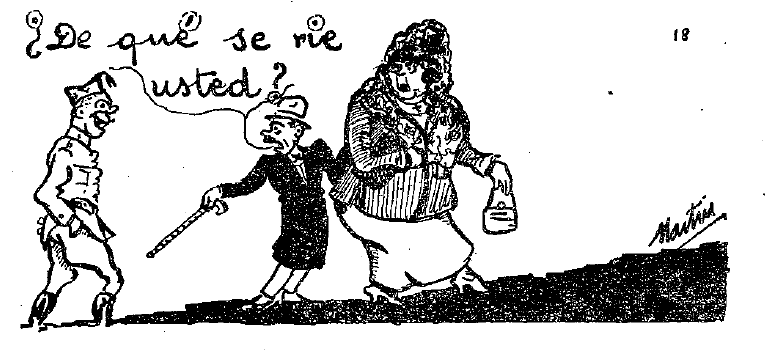
| Языки :: Испанский |
| Аудио |

 |
|
 |
|
51 |
Español |
Spanish |
|
Lección Dieciocho (18) |
||
| De ningún modo | By [of] no means. | |
| 1 |
No puedo contener la risa; la señora, que no comprende mi entusiasmo, pregunta con un poco de desconfianza : |
I cannot repress [contain] my [the] laughter: the lady, who does not understand my enthusiasm, asks with a little [of] diffidence : |
| 2 | ¿Qué pasa? ¿De qué se ríe usted? | What is the matter [what passes] ? About [of] what do you laugh? |
| 3 |
No se incomode usted, señora. Es que... Mire usted este anuncio... General Pardiñas; |
Don't be angry. (It) is [that]... Look (at) this ad.;... Gen. Pard. |
| 4 | hace cinco minutos que quiero
preguntarle si conoce esta misma calle, |
For five minutes I have wanted [it makes 5 minutes that (I) want] to ask
you if (you) know this same street, |
| 5 |
y resulta que vive usted en ella. ¡Qué coincidencia! |
and it turns out [results] that you live in it. What (a) coincidence! |
| 6 |
¡Ja, ja, ja! ¿Habrá usted pensado que soy muy habladora? |
Ah ah ah! You will have thought that (I) am very talkative? |
| 7 |
De ningún modo, señora. Yo hablo el español tan poco y tan mal que... |
By [of] no means, madam. I speak Spanish so little and so badly that... |
| 8 |
No se disculpe usted. Es verdad que me gusta (1) mucho hablar. Es mi vicio; lo confieso, soy así... |
Don't excuse yourself. (It) is true [truth] that I like (very) much to talk [me pleases m. to t.]. It's my vice; (I) confess it, (I) am like this [thus]. |
| 9 | Señora, estoy confuso, de verdad (2). | Madam, I am ashamed, in [of] truth. |
| EJERCICIOS | EXERCISE : | |
| 1 | ¿Cómo estudia usted cada lección? | How do you study each lesson? |
| 2 | La leo en voz alta, y si no
comprendo, miro la traducción inglesa. |
I read it aloud [in voice high], and if I don't understand,
|
| 3 | ¿No mira usted la pronunciación figurada? | Don't you look (at) the figured pronunciation? |
| 4 | Muy poco; la pronunciación es fácil, con la indicación de la sílaba tónica. |
Very little; the pronunciation is easy, with the indication of the stressed [tonic] syllable. |
| 5 | Cuando he terminado, leo cada frase otra vez, | When I have finished, I read each sentence (an) other time, |
| 6 | y la repito después, en voz alta también, sin mirar el libro. | and repeat it afterwards, aloud also, without looking (at) the book. |
| 7 | ¿Y no lee usted las notas? | And don't you read the notes? |
| 8 | ¡Claro que sí! Las notas me ayudan (a-yoodan) mucho. | Of course [that] yes! The notes help me much. |
| 9 | ¿No tiene usted los discos? - No, pero pronto voy a comprar unos. |
Have you not the records? - No, but soon I am going to buy some. |
| NOTES. | |
| 1 |
We have seen gusto, taste, pleasure. |
| 2 |
Note : soy así and
estoy confuso. |
|
Uno, una, one, a, may he put in the plural,
and mean some, a few. |
